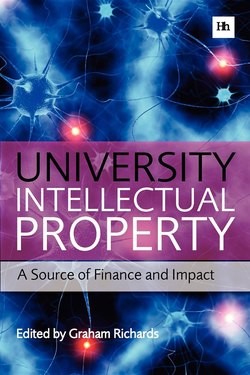Читать книгу University Intellectual Property - Graham Richards - Страница 5
На сайте Литреса книга снята с продажи.
1. Introduction
ОглавлениеBy Graham Richards
I am not a lawyer, but nonetheless I have had considerable experience of the exploitation of university intellectual property (IP) in some 50 years at Oxford University – where I chaired the very large Chemistry Department – and extended periods in California at Stanford University and at University of California, Berkeley. I was directly responsible for the creation of several spin-out companies from university research departments, have acted as a non-executive director or chairman of several more, and have been associated with perhaps another 50 companies created on the basis of university IP.
The current economic situation, where governments are unlikely to be able to fund universities to a level at which they would wish, makes it increasingly certain that universities will look to their intellectual property as a source of finance. The most important reasons for the existence of universities are to provide teaching and to perform original research, but this third leg of IP exploitation is certainly going to grow in importance.
This increasing pursuit of commercialisation of research need not undermine the other work that universities do. Professor G. H. Hardy of Trinity College, Cambridge may have toasted the Cambridge Mathematical Society as follows: ‘Here’s to pure mathematics. May it never be applied’, but his wish was in vain because there is no branch of science of which one can be sure that it will never have any practical application. As another wise man once said, ‘there are only two sorts of research: applied research and yet to be applied research’.
Indeed, the most successful and financially rewarding returns from the exploitation of intellectual property have in fact arisen from blue-sky research, so there is no reason for a change in emphasis towards exploitation [of intellectual property] to cause academics to modify their choices of research topic. They just need to be aware, as does their department and the central university, of the possibilities, pitfalls and mechanisms in the area of exploiting university IP. My experience has shown that as universities and their academics look to exploit the IP they have developed, they are going to come up against a number of problems. This is because the situation regarding the ownership of IP generated in universities is unclear in many instances and the system of rewards for academics and their students if the exploitation is successful is even less straightforward.
Part of this confusion is over patents and a lot of energy is usually expended in resolving disputes that arise in this area. However, there are other key areas too and if we are going to have sensible policies, preferably standardised across the sector, that lead to benefits for both institutions and individuals then copyright, trade marks, and even consulting and advising, should be included in government and university policy.
In this book I intend, with the help of experienced colleagues, to try to clarify the situation with regard to intellectual property and reward structures for those who create it. We also suggest what might be sensible modifications to the current practices so as to increase the value of returns and to achieve the fairness which most academics can endorse.
